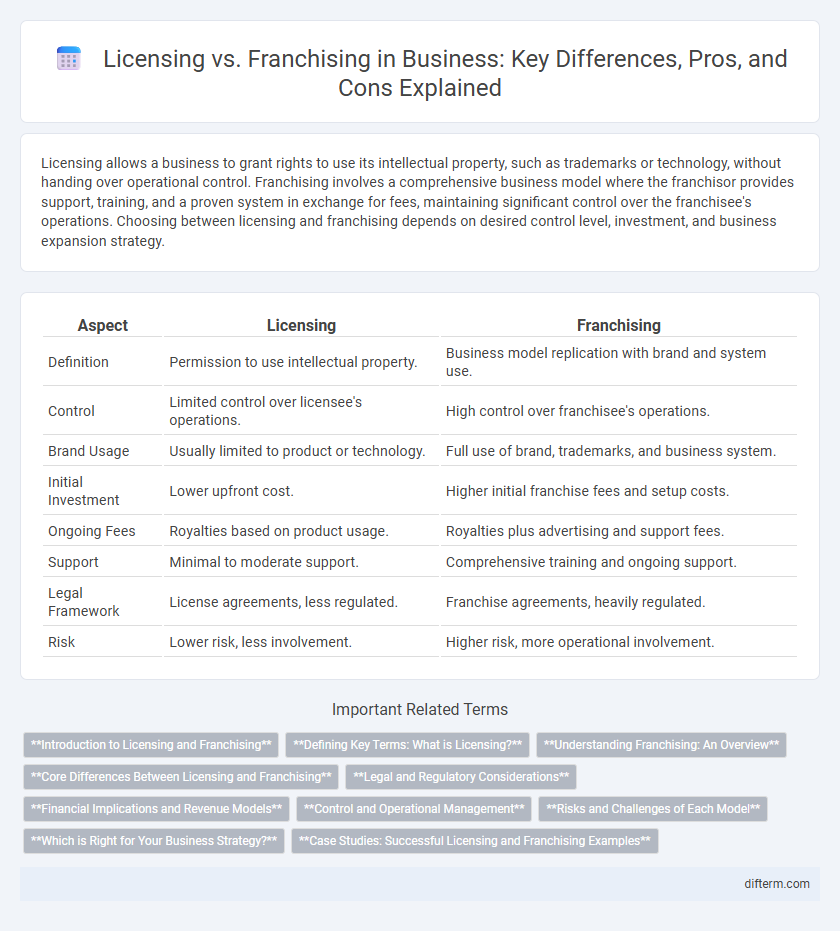Licensing allows a business to grant rights to use its intellectual property, such as trademarks or technology, without handing over operational control. Franchising involves a comprehensive business model where the franchisor provides support, training, and a proven system in exchange for fees, maintaining significant control over the franchisee's operations. Choosing between licensing and franchising depends on desired control level, investment, and business expansion strategy.
Table of Comparison
| Aspect | Licensing | Franchising |
|---|---|---|
| Definition | Permission to use intellectual property. | Business model replication with brand and system use. |
| Control | Limited control over licensee's operations. | High control over franchisee's operations. |
| Brand Usage | Usually limited to product or technology. | Full use of brand, trademarks, and business system. |
| Initial Investment | Lower upfront cost. | Higher initial franchise fees and setup costs. |
| Ongoing Fees | Royalties based on product usage. | Royalties plus advertising and support fees. |
| Support | Minimal to moderate support. | Comprehensive training and ongoing support. |
| Legal Framework | License agreements, less regulated. | Franchise agreements, heavily regulated. |
| Risk | Lower risk, less involvement. | Higher risk, more operational involvement. |
Introduction to Licensing and Franchising
Licensing and franchising are strategic business models that enable brand expansion with reduced capital investment. Licensing grants permission to use intellectual property, such as trademarks or patents, allowing licensees to produce or sell products under established brands. Franchising involves a comprehensive system where franchisees operate under the franchisor's business model, leveraging brand recognition, marketing support, and operational guidelines to maintain consistency across locations.
Defining Key Terms: What is Licensing?
Licensing is a business arrangement where the licensor grants the licensee the legal right to use intellectual property, such as trademarks, patents, or technology, under defined conditions. This allows the licensee to produce, sell, or distribute products without owning the underlying assets, generating revenue through royalties or fees. Licensing differs from franchising in that it typically involves fewer operational controls and does not encompass the entire business system.
Understanding Franchising: An Overview
Franchising is a business model where a franchisor grants the franchisee the rights to operate under its brand, using its trademark, products, and operational methods. This arrangement often includes comprehensive support such as training, marketing, and ongoing assistance to ensure brand consistency and operational success. Franchisees benefit from established brand recognition and a proven business system, reducing startup risks compared to independent ventures.
Core Differences Between Licensing and Franchising
Licensing grants permission to use intellectual property such as trademarks, patents, or technology without direct involvement in the licensee's business operations, whereas franchising provides a complete business model including brand, operational systems, and ongoing support. Licensees maintain independence, paying royalties for usage rights, while franchisees adopt standardized practices and benefit from established brand reputation and training. The core difference lies in control and integration: franchising ensures brand consistency and operational oversight, whereas licensing is limited to IP usage without operational control.
Legal and Regulatory Considerations
Licensing agreements require careful adherence to intellectual property laws, ensuring the licensor's trademarks, patents, or copyrights are properly protected and enforced. Franchising involves strict compliance with franchise disclosure laws and franchise relationship laws, which regulate the disclosure of financial performance, fees, and operational requirements to protect franchisees. Both models demand vigilant contract management to navigate regulatory risks and avoid potential legal disputes over proprietary rights and business operations.
Financial Implications and Revenue Models
Licensing typically involves lower upfront costs and ongoing royalty payments based on agreed percentages of sales, offering a flexible revenue model with reduced financial risk for licensors. Franchising requires higher initial investment and fees, including franchise fees and a share of operational revenue, providing a more structured and scalable income stream for franchisors. The financial implications for franchisees are greater due to mandatory operational standards and marketing contributions, whereas licensees benefit from more autonomy but with potentially less brand support.
Control and Operational Management
Licensing grants limited control to the licensee, as the licensor typically provides intellectual property rights without overseeing daily operations, leading to less influence over business practices. Franchising involves a higher degree of control and operational management by the franchisor, including strict guidelines, standardized procedures, and ongoing support to ensure brand consistency. This operational oversight allows franchisors to maintain quality control and uniform customer experience across all franchise locations.
Risks and Challenges of Each Model
Licensing carries risks such as loss of control over brand integrity, potential intellectual property infringement, and dependency on licensee performance, which can hinder consistent market representation. Franchising presents challenges including high initial setup costs, strict regulatory compliance, and the complexity of maintaining uniform operational standards across multiple franchise locations. Both models require careful due diligence to mitigate financial, legal, and reputational risks inherent in expanding business reach.
Which is Right for Your Business Strategy?
Licensing allows a business to grant another party the rights to use its intellectual property, enabling faster market entry with lower capital investment. Franchising involves a more comprehensive, ongoing relationship where the franchisor provides brand support, training, and operational control, ideal for businesses seeking rapid expansion with maintained brand consistency. Evaluating your growth goals, control preferences, and resource availability helps determine whether licensing's flexibility or franchising's structured approach aligns better with your strategic objectives.
Case Studies: Successful Licensing and Franchising Examples
McDonald's franchise model exemplifies rapid global expansion, leveraging standardized operations and brand consistency to drive profitability in diverse markets. Disney's licensing strategy, particularly with merchandise and media, demonstrates effective brand extension without capital-intensive growth, generating substantial royalty revenues. Both approaches highlight strategic use of intellectual property to maximize market reach while balancing control and scalability.
Licensing vs Franchising Infographic

 difterm.com
difterm.com